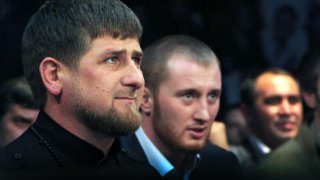Vladimir Putin’s Chechen Time Bomb
Chechen warlord Ramzan Kadyrov’s ailing health and lack of a succession plan may create opportunities for terrorist and separatist activity in Russia’s most unstable republic.
Ramzan Kadyrov, the leader of Chechnya since 2007, was diagnosed with pancreatic necrosis in 2019. It was reported last week that his health has taken a serious turn for the worse, and he is in “critical condition” with perhaps months left to live. Novaya Gazeta Evropa broke the story based on research dating to 2019, including reports of Kadyrov missing many key public appearances, including the United Russia Party Congress in December of last year. Appearing in photos with Vladimir Putin last September, the Chechen leader’s face appeared bloated. A PR video of Kadyrov pumping iron in a gym was released this week to promote an image of health. It is not very convincing; he is lifting at most 50 percent the weight, usually far less, than I, a sixty-five-year-old getting a hip replacement next month, can lift. Ramzan is not in good health.
Chechnya has been reasonably stable since Ramzan took over as president at age thirty, three years after his father Akhmat, also president, was blown up in a Victory Day celebration in May 2004. The relationship between Putin and Kadyrov, while framed as like father and son, is actually a Faustian bargain. Kadyrov receives huge subsidies from Moscow to distribute as he sees fit and free sway in controlling the notoriously troublesome republic. Putin gets a stable Chechnya, and Kadyrov has been eager to support Putin by sending more than 20,000 Chechen soldiers to the war in Ukraine and carrying out the occasional political assassination.
It appears that Kadyrov would like to maintain a family dynasty (he has at least fourteen known children) and has recently promoted his eighteen-year-old son Akhmat to Minister of Sport and Youth and sixteen-year-old Adam as a trustee at Special Forces University in the Chechen capital, Grozny. Adam bears the strongest resemblance to his father and seems to have inherited his father’s sadistic and violent nature. In September 2023, Ramzan released a video of Adam, then fifteen, beating up a Ukrainian in detention accused of burning the Koran. However, since Chechnya’s constitution calls for the president to be at least thirty years old, it would seem unlikely that Kadyrov Sr. could engineer a family dynastic succession, at least in the short term.
Unquestionably, the Kremlin will seek a peaceful succession. Ramzan Kadyrov’s consistent support for Putin has been very valuable for the Russian president, even if it has raised the hackles of some in the Russian intelligence and security agencies who view Kadyrov as a loose cannon with his own regional ambitions in the North Caucasus. But the historical grievances of Chechens against Russia run deep. The Chechens fought decades-long struggles for independence against the Tsars in the nineteenth century, suffered from Stalin’s mass deportations from their homeland, and struggled against Moscow rule in two wars in the 1990s and 2000s. Chechnya is a volatile place with a well-armed population.
The ISIS-K-sponsored attack conducted by Tajik guest workers at Crocus City Hall in Moscow, resulting in more than 140 dead, marked the end of a six-year lull in Islamic terrorist attacks in Russia. For more than twenty years before 2018, the catalyst for nearly all terrorist attacks in Russia came from Chechen groups and others from the North Caucasus. In 2012 and 2013, most of the fighters in the North Caucasus found conditions too difficult for fighting at home and moved to join ISIS in Syria and Iraq, where, by 2018, the majority were killed.
Global Jihadist group ties to the North Caucasus, however, date back to the 1990s, and the links with ISIS remain. Chechnya was de facto independent in the late 1990s as the Islamic Republic of Ichkeria and served as a criminal hub of trafficking in all manner of illicit goods. When legendary Chechen leader and author of the largest terrorist attacks in Russia, Shamil Basaev, led Chechen troops across the border into Dagestan in August 1999, the second Chechen War began, which catapulted new Prime Minister Vladimir Putin to public acclaim.
Putin understands the immense value of a subdued Chechnya in the Russian Federation. His symbiotic relationship with Ramzan Kadyrov has served the interests of each leader very well, but it has not been without costs. Kadyrov and his fearsome legions of “Kadyrovtsy” have created many potential opponents to stability in Chechnya and Russia at large. The large number of Chechen casualties in Ukraine add to a seething dissatisfaction there. It is not hard to imagine that ISIS and other Jihadi groups could come to view Chechnya and the North Caucasus once again as an attractive target for mayhem. Putin’s concern for this possibility may well be a factor in his very public support for Palestinians in the war in Gaza. With Russian intelligence and security forces already stretched to the breaking point, the near future would be a particularly inopportune time for unrest in Chechnya.
Andy Kuchins is a Senior Fellow at the Center for the National Interest and Adjunct Professor at the Johns Hopkins University School of Advanced International Studies in Washington, DC. Follow him on X: @AndyKuchins.
Image: Shutterstock.com.

